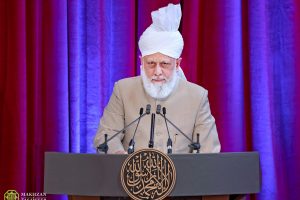
Saiha Maaz
The liberal understanding of religion lays great emphasis on freedom of choice and the right to change beliefs. The right to follow one’s own religious persuasion and indeed to invite others to do the same is considered an inalienable human right.
The right to choose a faith is not a conferred right, but a natural entitlement of every human being. The law does not assign this right, it merely asserts, protects, and ensures its entitlement.
The United Nations Universal Declaration of Human Rights defines religious conversion as:
‘… the right to freedom of thought, conscience and religion; this right includes freedom to change his religion or belief’ (Article 18). It adds: ‘No one shall be subject to coercion which would impair his freedom to have or to adopt a religion or belief of his choice’ (Article 18.2). [1] Thus ICCPR article 18(1) protects not just the internal components of belief, such as choosing one’s religion. It also guarantees ‘freedom, ….… to manifest [one’s] religion or belief in worship, observance, practice and teaching.’ One such manifestation is ‘non-coercive attempts to persuade others, sometimes called ‘missionary work.’ [2]
The right to conversion connotes an individual’s right to leave one religion and embrace another voluntarily. This freedom, though sacrosanct and fundamental in all religions, is an exception in today’s world, not the rule. Entertaining notions of religious conversion often instigates severe reactions in many societies. The resulting discord has much less to do with religious dogma than with power structures, within the family or the state and politics. Even in some modern liberal democracies, traces of the mind-set exist that places religion in the civic category, making conversion a matter of public negotiation, rather than private belief.
Conversion can never be seen as a purely individual matter in a situation where religion and political authority are in league. When religiously defined communities are at odds with each other, changes in spiritual allegiance can trigger acts of violence and result in widespread social upheaval. Violations of fundamental human rights in this sensitive area also include forced conversions or reconversions. In addition, the rights of converts or those trying non-coercively to convert others are sometimes questioned in principle as well.
Heiner Bielefeldt, the United Nations Special Rapporteur on freedom of religion or belief from 2010 to 2016, devoted one of his reports to the issue of conversion because violations of the right to convert had ‘become a human rights problem of great concern.’ [3]
The report noted that such abuses are often perpetrated in the name of religious truth claims, promotion of national identity and social homogeneity, or maintaining national security. The Pew Research Center reports that in the year ending December 2015, 42 countries restricted religious conversion. In 25 countries there were incidents of social hostility over conversion and in 27 countries there was physical violence as a result.[4] Many countries have laws banning blasphemy and apostasy, which ultimately affect the ability to convert. For instance, Pakistan’s infamous blasphemy law makes it virtually impossible for anyone to change their religion. [5]
Some countries distinguish voluntary, motivated conversion from organized proselytising, attempting to restrict the latter. The boundary between the two is not easily defined: what one person sees as legitimate evangelizing can be seen as intrusive and improper by another. In Greece, it is unconstitutional to proselytise making life for Jehovah’s Witnesses or Mormons really hard.
Four countries in South and Southeast Asia — India, Nepal, Myanmar, and Bhutan — have laws that severely regulate religious conversion. In half a dozen Indian states, a mere declaration – whether oral or in writing – is not even considered conversion. [6]
Religious conversion is a multifaceted and multi-dimensional phenomenon. In many parts of the world, conversion from one religion to another entails several legal consequences including succession, marital status, and the right to seek elected office. Change of religion is grounds for divorce in some countries.
As far as Islam is concerned, the overarching principle is ‘There should be no compulsion in religion.’ [7] The Holy Qur’an declares faith to be a matter of the heart and that it is up to every individual to choose their beliefs as they see fit. It is a God given right to accept or reject the beliefs of any religion and one is answerable to God alone for that choice. The Holy Qur’an’s pragmatic declaration is ‘let him who will, believe, and let him who will, disbelieve.’ [8]
Thus, no individual, group of people or indeed government has the right to persecute, coerce, punish, or legislate against anyone for his or her choice of belief. A direct statement of policy about freedom of conscience presented by the Quran, categorically states, ‘For you, your religion; and for me, mine’. [9]
Freedom of conversion is the real test of ‘no compulsion in religion’. A one-way freedom, to enter Islam but not to leave it, would be meaningless. Numerous Qur’anic verses address recantation but not even one hints at any punishment for it. Of course, all religions admonish the faithful to remain firm on their faith. Naturally, so does Islam. However, in the Holy Qur’an we also witness a uniquely liberal concept of free movement between religions. It presents the fluid state one passes through in the quest of truth- an ebb and flow of faith, as it were. The Qur’an says, ‘Those who believe, then disbelieve, then again believe, then disbelieve, and then increase in disbelief…’ [10]
This verse not only proclaims that whoever decides to abjure Islam has a fundamental right to do so, it also declares that if someone chooses to renounce Islam, they have the opportunity to re-enter if they want. It even provides the room to reconsider these choices multiple times without a shadow of coercion.
Thus, The Holy Qur’an guarantees individuals the right of perfect freedom of belief and conscience. It is a volitional right of everyone to profess his or her faith and propagate it.
Though the concepts of freedom of conscience and choice are at the core of every logical belief set, it is the religious dominion itself that impedes exercising that choice. Whether the impetus is political or religious, anti-conversion laws in pith and substance violate basic human rights because their terms are vague and overly broad and end up targeting minorities and restricting the fundamentally personal decision to change one’s religion.
About the Author: Saiha Maaz holds a joint degree in English Literature and Economics from Kinnaird College Lahore and a Diploma in Media and Communications from the University of Birmingham. She holds a keen interest in refugee rights and has worked closely with the Welsh Refugee Council and other charities in the UK. She is a passionate advocate of building community and interfaith relations, the discourse around women in Islam, and has widely written and spoken on these issues in both print and online media.
ENDNOTES
- International Covenant on Civil and Political Rights art. 18(1) & 18(2), Dec. 16, 1966, S. Exec. Rep. 102-23, 999 U.N.T.S. 171 [
- Declaration on the Elimination of All Forms of Intolerance and of Discrimination Based on Religion or Belief art. 1, U.N. Doc. A/RES/36/55 (Nov. 25, 1981)
- Heiner Bielefeldt (Special Rapporteur on freedom of religion or belief), Interim report of the Special Rapporteur on freedom of religion or belief, ¶ 15, U.N. Doc. A/67/303 (Aug. 13, 2012) [hereinafter Bielefeldt, Right to convert].
- PEW RESEARCH CTR., TRENDS IN GLOBAL RESTRICTIONS ON RELIGION app. D at 62 (GRI.Q.7) (2017), https://assets.pewresearch.org/wp-content/uploads/sites/11/2017/ 04/07154138/Appendix-D.pdf. The 42 countries and territories are Afghanistan, Algeria, Bangladesh, Bhutan, Brunei, Burma (Myanmar), China, Comoros, Egypt, Finland, Iceland, India, Indonesia, Iran, Iraq, Israel, Jordan, Kuwait, Kyrgyzstan, Laos, Lebanon, Malaysia, Maldives, Mauritius, Mexico, Morocco, Nepal, Norway, Oman, Pakistan, Qatar, Russia, Saudi Arabia, Somalia, Sudan, Syria, United Arab Emirates, United States, Uzbekistan, Vietnam, Western Sahara, and Yemen. Id., app. E at 8 (GRI.Q.7).
- Tehmina Arora, The Spread of Anti-Conversion Laws from India: A threat to the religious freedom of minorities, Lausanne Movement (2016), https://www.lausanne.org/content/ lga/2016-05/anti-conversion-laws-india. The National Commission for Justice and Peace says that as of 2014 633 Muslims, 494 Ahmadis, 187 Christians, and 21 Hindus had been accused of blasphemy since 1987. What are Pakistan’s blasphemy laws?, BBC (Nov. 6, 2014), https://www.bbc.com/news/world-south-asia-12621225.
- Meghan Grizzle Fischer, Anti-conversion laws and the international response, ADF International White Paper (2018),https://adfinternational.org/wp-content/uploads/2018/03/Anti-Conversion-Laws_eBook-1.pdf
- The Holy Quran (2:257)
- The Holy Quran (18:30)
- The Holy Quran (109:7)
- The Holy Quran (4:138)



Add Comment